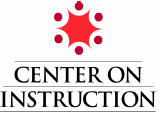Pre-Algebra and Algebra Instruction and Assessments

The Center on Instruction is operated by RMC Research
Corporation
in partnership with the Florida Center for Reading Research at Florida State
University; RG Research Group; the Texas Institute for Measurement,
Evaluation, and Statistics at the University of Houston; and the Vaughn
Gross Center for Reading and Language Arts at the University of Texas at Austin.
The contents of this PowerPoint were developed under cooperative agreement
S283B050034 with
the U.S. Department of Education. However, these contents do not necessarily
represent the policy of the Department of Education, and you should not
assume endorsement by the Federal Government.
2006
The Center on Instruction requests that no changes be made to the content or appearance of this product.
Algebra and
NCTM Focal Points
Overview of the Focal Points
• PreK through grade 8
• Important math topics / content in
mathematics by grade
• Cohesive clusters of related ideas /
concepts / skills that form foundation for
higher level mathematics
– NOT discrete topics that teachers teach
and students master
Algebra Learning Expectations
Across States: Grade 4
| State | Algebra | Total |
| California | 7 | 43 |
| Texas | 4 | 32 |
| New York | 5 | 56 |
| Florida | 10 | 89 |
| Ohio | 6 | 48 |
| Michigan | 0 | 56 |
| New Jersey | 6 | 56 |
| North Carolina | 3 | 26 |
| Georgia | 3 | 45 |
| Virginia | 2 | 41 |
Algebra in Prekindergarten
• Patterns: recognize and duplicate
sequential patterns
Algebra in Kindergarten
• Identify, duplicate, and extend:
– Number patterns
– Sequential and growing patterns with
shapes
• Preparation for creating rules that
describe relationships
– E.g., each new pattern grows by one
Algebra in Grade 1
• Understand connection between
counting and operations of addition and
subtraction (e.g., adding two is the
same as “counting on” two )
• Use properties of commutativity and
associativity to add whole numbers
• Begin to relate addition and subtraction
as inverse operations
Algebra in Grade 2
• Use number patterns to extend
understanding of properties of numbers
and operations
– E.g., skip counting builds foundation of
understanding multiples and factors
Algebra in Grade 3
• Understand meaning of multiplication
and division (equal “jumps,” equal-sized
groups, area models)
• Creation and analysis of patterns and
relationships involving multiplication and
division
Algebra in Grade 4
• Students understand number patterns
involving all operations and nonnumeric
growing or repeating patterns
– Can use rules to describe a sequence of
numbers or objects
– E.g., 2, 4, 8, 16, 32
Algebra in Grade 5
• Use patterns, models, relationships to
write and solve simple equations and
inequalities
E.g., 2, 4, 8, 16, _
_ = 16*2 = 32.
• Create graphs of simple equations
x: 1 2 3 4 5
y: 2 4 8 16 32
Algebra in Grade 6
• Algebra is a Curriculum Focal Point for
the first time on its own
• Write and evaluate mathematical
expressions; use expressions and
formulas to solve problems.
• Expressions in different forms can be
equivalent
• Understand that variables represent
numbers whose precise values are not
yet specified
Algebra in Grade 7
• Algebra is in all 3 Curriculum Focal
Points
Algebra in Grade 8
• Analyzing and representing linear
functions, solving linear equations , and
systems of linear equations
• Also beginning to explore nonlinear
functions
Algebra Instruction
Algebra and the Elementary
Grades
• Algebra has often been characterized as
developmentally constrained due to its
inherent abstractness (e.g., Kieran, 1981,
1985; Vergnaud, 1985)
• Research in the former Soviet Union
suggested that young children could
generalize arithmetic , moving from particular
to generalized numbers, learning to use
variables and covariation in word problems,
and focusing on the concept of function
(Davydov, 1991, Bodanskii, 1991)
Algebra and the Elementary
Grades
• Recent research suggests that
inappropriate instruction may have had
a decisive role in the poor results from
early studies of algebraic reasoning
among adolescents in the U.S. (Booth,
1988; Schliemann & Carraher, 2002).
Critical Topics for Teaching
and Learning Algebra
1. Variables and constants
2. Decomposing and setting up word
problems
3. Symbolic manipulation
4. Functions
5. Inductive reasoning and mathematical
induction
Milgram (2005)
| Prev | Next |